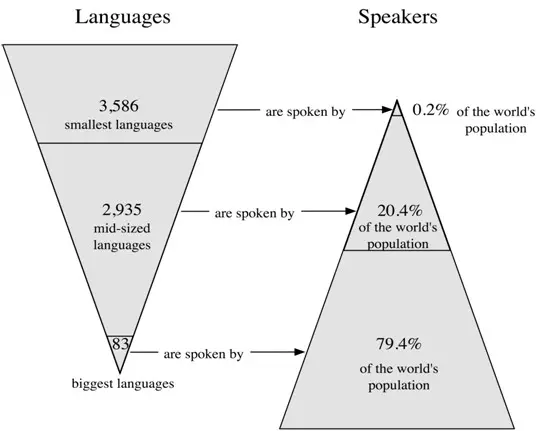The effects of globalization can be felt in languages too. Language being the main mode of communication of any human makes it very essential. It is a very complex type of system that uses signals, sounds, voice, gestures, symbols, grammar and many more. Some notable studies would say that language has many uses but the most important one would be its use for teaching and learning.
Language may be difficult to learn due to its complexity and depends on at least three variables namely, aptitude, motivation, and opportunity. This obviously differs a lot when comparing language between humans and non-human animals as humans seem to have a very open-ended type of language in that it allows us to produce a wide range of utterances from a finite set of elements, which also allows us to create new words and sentences.
This is because we communicate based on a dual-coded system in which finite meaningless elements can be combined to form an “infinite number of larger units of meaning”. Check out (internal article) how the English language originated from nowhere.
Global Common Language
In relation to the topic of language, the effects of globalization extend to a “global common language” in which it offers a vast amount of possibilities for any participating parties to mutually understand each other. Therefore, allowing us to delve and experience more opportunities with regards to international co-operation.
Globalization is also made easy through the existence of multilingualism, in such a way that numerous languages are used by either separate individuals or by the same nation. With such a spread of international languages such as English, French, Chinese, etc., as a language of political and economic strength, this then encourages those who don’t speak these languages to learn how to speak them, thus, increasing their ability to be immersed into globalization.
Recommended reading (internal article): Learn how I Love You is expressed in 310 different world languages with native writings.
Language Variations
In the past few centuries, the language variations and the spread of a Lingua Franca came through migration (Relocation diffusion) and conquest (hierarchical diffusion).
Lingua franca
A language that is adopted as a common language between speakers whose native languages are different but adopted for the purposes of having a common language for business, trade, and politics.
Example: Historically, French was a global lingua franca. Today, it is English. Other examples are Russian in the Soviet Union and Swahili in East Africa.
Pidgin language
A simplified version of a lingua franca, used to communicate typically in areas where contact is just beginning. Simplified means of communication between two groups that do not share a common language. Simple grammar and vocabulary; easy to learn.
Example: Pidgin English in Nigeria, Spanglish, Franglais.
Creole Language
Creolization: When pidgin language becomes a mother tongue. Creole is a stable natural language developed from a mixture of different languages. Stable over time, complex grammar and vocabulary, etc. Often a blend of colonizers and indigenous peoples, associated with cultural and often racial mixture. Creole speakers have parents who use pidgin.
Example: Afrikaans
| Pidgin | Creole |
|---|---|
| No native speaker | Native speakers exist |
| Mixing of language | Mixed language associated with cultural and often racial mixture |
| Limited vocabulary and grammar | Have parents who use pidgin |
Dialect
A regional variety of a language distinguished by pronunciation, spelling, and vocabulary. Usually occurs because of the migration of a language.
Example: English to North America.
- Social Dialects can denote social class and standing.
- Vernacular Dialects denotes the common slang, speech of a region.
Standard Language
In a language with multiple dialects, one may be recognized as the standard language. A dialect that is well-established and widely recognized as most acceptable for government, etc.
Example: In English, this standard language is called British Received Pronunciation (BRP).
Isolated Language
A language that is unrelated to any other and therefore not attached to any language family.
Can be vigorous or endangered!
Example: Basque
Extinct Language
A language that was once used by people in daily life but is no longer in use.
Example: Clallam, Latvia
Effects of Globalization and Evolution of Global Language
Latin was used to be known as the strongest language worldwide a few centuries back, also because it was promoted heavily by the Catholic Church. In the 17th century, French then replaced Latin and was known to be the language of exchange for diplomats and used for international relations at it was then known as lingua franca.
By the time the 19th century was reached, the British had such a strong influence worldwide and then promoted English, therefore, making this the widely used language up until the 20th century did not have any serious contenders.
Today, would the effects of globalization and the growth of the Chinese economy create a fight between Mandarin and English?

Coronavirus and Globalization
The outbreak of new coronavirus in 2020, Covid-19, would precipitate the “waning of globalization”. The Covid-19 has gone from China with ripple effects to a global pandemic, is already playing into today’s nationalist narratives. The Covid-19 impact might last until the end of 2022.
The outsiders such as foreign merchants and the marginalized poor, historically fingered as the culprits, are going to take the blame this time too, leading to shutting down of borders. “The future does not belong to globalists,” President Trump declared in September 2019, might soon become a reality. President Trump’s “America first” style of diplomacy puts nationalism ahead of multilateral efforts.
China is already too big and too powerful to be constrained by any other country, even the United States. Though China is not so big and so powerful as to evade all constraint entirely, the pressure on China would only work if it was multilateral. For instance, if the USA could have acted jointly with the European Union, Japan, and other global partners, that assemblage of states might sway China.
From the global common language standpoint, China is going to aggressively promote the Mandarin language and so are the countries such as Japan, Korea, India, Germany, France, etc.
Read also: Languages of China, as Chinese language has many dialects.
Can Mandarin beat English?
The effects of globalization on language can be felt in this century. As the 21st century began, China had begun promoting the Mandarin language, which is now known to be the strongest contender of the English language. Today, the Chinese government is using the Confucius Institute to further promote the language worldwide. Being that this is being strongly organized by them, many have been having assumptions that they could most-likely replace English in the future.
When it comes to economical situations, nowadays, we see China going up against and challenging America for the position of power worldwide, therefore, asserting the dominance as well of the Mandarin language. While the number of those who speak this language as their mother tongue is above 1.3 billion globally, the language is only known to be limited to Chinese and foreign-country-born Chinese.
However, the 1.3 billion is a significant number as among the Chinese speakers, the young generation prefers the Mandarin dialect to other ancient Chinese dialects spoken by their ancestors. The Mandarin, the official dialect of People’s republic of China, would further strengthen its dominance in the next few decades, becoming a common dialect of Chinese community worldwide.
Additionally, when it comes to the population of those who use Chinese as their second language, the number is much less. While there has been some increasing enthusiasm for learning Mandarin, this still cannot be compared to that of the English language.
Conclusion: Effects of Globalization
The Mandarin language is still trying to work towards attaining its dominance over the globe, as the English language has done. However, the success of this still largely depends on how strongly the Chinese government will be willing to promote it globally, and as well as how willing the foreigners will be to learn the language.

